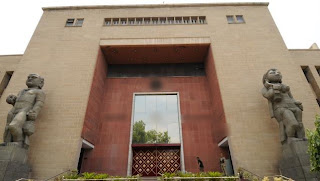 |
| Safeuarding Prudential Banking |
As the Reserve Bank gets ready
to announce guidelines for new banking licences within the next fortnight, the
fine print in those very guidelines have become a bone of contention between
the country’s central banker, charged with safeguarding prudential banking norms, and the
Finance Ministry, which wants new banks to pep up the economy.
The Reserve Bank is adamant
that it wants guidelines framed to keep out large corporate houses and real
estate Moghuls from cornering these licences, as their business interests may
clash with prudential norms needed to run banks they want to float. The finance
ministry is just as adamant that rules should not keep corporate houses out,
but rather rules should set up Chinese walls between owners and banking
operations, so that owners can turn in profits but not subvert banking norms.
Unfortunately for North Block,
the chairman of the prime minister’s economic advisory council, C.Rangarajan, a
former RBI chief himself, has thrown his weight behind the central bank’s point
of view.
A string of disastrous bank
collapses in the 1960s, had seen the Indira Gandhi led Congress government
nationalizing most large banks. There were
accusations of widespread abuse of public
funds by bank owners who often siphoned off monies to run risky businesses,
whose failure jeopardised the entire banking and financial industry. The
central banker points to this history and lack of any evidence that Indian
business houses will be willing to change their ways for its unwillingness to
grant bank licences to corporates.
RBI’s allergy towards real
estate Moghuls like DLF being allowed to run banks stems from similar
considerations, buttressed by examples of the mortgage crisis faced by American
banks. The fear obviously is that realty firms allowed to own banks would use
them to fund development and sale of risky realty projects, which in turn could
promote a property bubble.
Finance Ministry officials
argue that powers of supervision which the RBI was seeking including powers to
supercede entire bank boards, if they were suspects in wholesale frauds, have
been given through a banking amendment act passed by Parliament in the last
Parliament session and the central bank has consequently no excuses in not
agreeing to allow corporates entry into the banking sector.
One way out of the
imbroglio, which is being suggested by officials trying to work out a
mediation, is that the rules do not specifically prohibit large corporates from
applying for licences, but preferences are built into the guidelines which
would continue the current system where private banks are allowed as
`graduates’ from among merchant bankers and financial firms which had grown
large enough to qualify as banks.
The problem with
continuation of the earlier system is that those whom the RBI granted licences
last time round they were given out, included some merchant bankers who proved
to be damp squibs at best and horror stories at worst – these included --
Centurion Bank and Bank of Punjab – which had to be merged and later acquired
by HDFC Bank as well as scam-hit Global Trust Bank which had to be ultimately
taken over by Oriental Bank of Commerce.
No comments:
Post a Comment